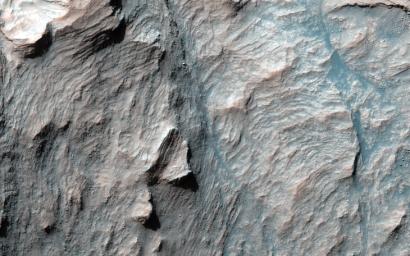
|
Beautiful Layers in the Central Uplift of Mazamba Crater
- Click the image above for a larger view
- Full-Res JPEG (2880 x 1800) (935.8 kB)
- Full-Res TIFF (2880 x 1800) (15.6 MB)
Caption:
This is only one of four impact craters known that possesses intact layers exposed in the central uplift.
Scientists believe this layered material originates from kilometers beneath the present surface and is raised up during the formation of the crater itself. These craters give us a window into these deep layers, which would otherwise remain hidden.
Background Info:
HiRISE is one of six instruments on NASA's Mars Reconnaissance Orbiter. The University of Arizona, Tucson, operates the orbiter's HiRISE camera, which was built by Ball Aerospace & Technologies Corp., Boulder, Colo. NASA's Jet Propulsion Laboratory, a division of the California Institute of Technology in Pasadena, manages the Mars Reconnaissance Orbiter Project for the NASA Science Mission Directorate, Washington.
Cataloging Keywords:
| Name | Value | Additional Values |
|---|---|---|
| Target | Mars | |
| System | ||
| Target Type | Planet | |
| Mission | Mars Reconnaissance Orbiter (MRO) | |
| Instrument Host | Mars Reconnaissance Orbiter | |
| Host Type | Orbiter | |
| Instrument | High Resolution Imaging Science Experiment (HiRISE) | |
| Detector | ||
| Extra Keywords | Color, Crater, Impact | |
| Acquisition Date | ||
| Release Date | 2013-10-30 | |
| Date in Caption | ||
| Image Credit | NASA/JPL-Caltech/Univ. of Arizona | |
| Source | photojournal.jpl.nasa.gov/catalog/PIA17624 | |
| Identifier | PIA17624 | |
